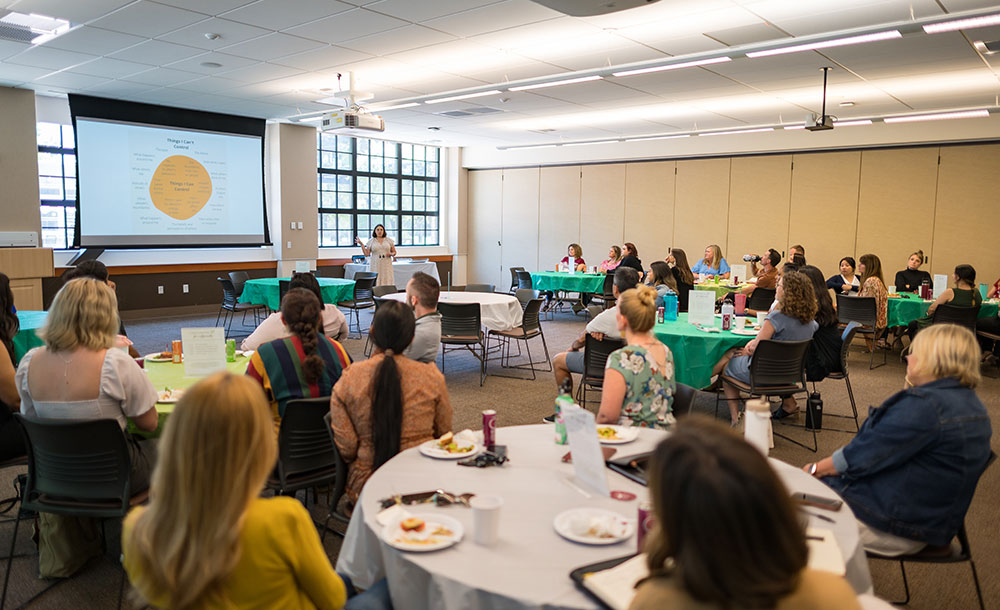Advisor Wellness Initiative Secures Second Round of Funding

At Chico State, and on campuses across the nation, academic advisors provide some of the most direct, sustained, hands-on support to students throughout the journey to graduation. They help students navigate everything from course requirements and GE planning to financial aid and housing applications, as well as referrals to critical services. This requires a wide view of the academic landscape, an in-depth knowledge of available campus services, and a strong empathetic foundation to build productive relationships.
“We don’t just offer academic support. If our students are struggling with personal issues, whether that be mental health, food insecurity, or homelessness, we give referrals to those services,” said Dominique Silva Soares, MSW, an advisor with the Educational Opportunity Program.
Academic advisors are some of the hardest-working advocates for student success on campus. While rewarding and meaningful, the work is also mentally and emotionally taxing at times.
Community Health
In 2022, The Chico State advising community secured a $30,000 grant from the Stupski Foundation to provide academic advisors with programming designed to help improve their overall wellness, reduce work-related burnout, and energize teams throughout the year. In simpler terms: the grant provides support to those who support others.
Spearheaded by a cross-divisional Advisor Wellness Implementation Team, this funding has been used to measure current levels of burnout amongst those in academic advising roles, and then target resources at the root cause of burnout to improve the overall wellness of the campus advising community.
“We are moving towards the mentality of community care and really preparing everybody to be well, day in and day out,” said Kylee Sharp, Interim Associate Director of Professional Development and Assessment. “We know there are small things that we can do to support one another in communities, but those are often short-lived. We really want to create a culture where we’re prioritizing and valuing emotional and physical wellness, so that we can all show up for students feeling fulfilled and equipped to meet the tasks at hand.”
The Advisor Wellness Implementation Team:
- Kylee Sharp, Interim Associate Director for Professional Development & Assessment
- Shawn Brackett, College Advising & Retention Specialist, College of Communication and Education
- Teresa Hernandez, First Year Experience Coordinator/Advisor, Educational Opportunity Program
- Jennifer McKee, Developmental Math Coordinator, Department of Mathematics and Statistics
Out of this initial groundwork, the first Advisor Wellness Luncheon recently brought teams from across campus together for an afternoon to connect, learn, and share with others doing similar work. The event provided space for advisors to discuss their experiences and challenges, build community, and hear a keynote presentation by Courtney Chambless of the WellCat Counseling Center on how to improve and preserve one’s emotional well-being in a helping profession. It also provided the Wellness Implementation Team with a platform to lay out their vision for long-term advisor support and gather important feedback from peers.
Long-Term Development Goals
The advisor role is not designed around emotional support or counseling, but as good relationship builders who care for students, it is often to draw hard lines between layers of support.
“It’s hard not to put 110% of myself into this work,” said Daisy Linsangan, an Academic Advisor for undeclared students. “I often find that when I drive home from work, I’m still thinking about a student’s situation.”
That is why equipping advisors with structures and resources to support their wellness, as well as developmental training opportunities, is so important to their well-being and to the success of students.
“We want to build a culture where advisor wellness is front of mind, right alongside student wellness,” said Shawn Brackett. “Because we need both. This will take time, persistence, and help to create the shared rituals, traditions, and practices that help everyone first understand the value of our work, and then what it takes to provide these services well. From there, we can do a better job of supporting, developing, and rewarding our advisors as they continue to help students.”
Chico State has made a commitment to continue the work of promoting advisor wellness beyond the initial funding. Additionally, it was one of the few institutions selected to receive a second grant of $20,000 from the Stupski Foundation to continue such work. A secondary implementation team will be convened to create and launch a multi-tiered, self-paced advisor training program designed to further improve advisor wellness by putting individuals in control of their own professional development progress.


